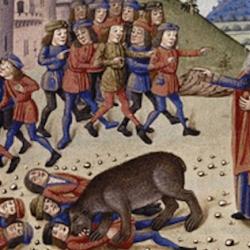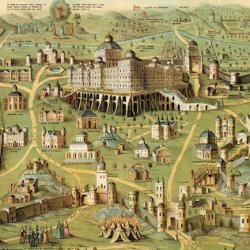INTRODUCTION
Elijah is a new Moses, and like Moses he confronts the ?Pharaoh?EAhab and his hundreds of ?magicians.?EBy his victory in this context, Yahweh not only humiliates the gods of the Canaanites, and the Israelites who act like Canaanites. He also calls and leads Israel to repentance (vv. 39-40). This is a real renewal of covenant.
THE TEXT
?And it came to pass after many days that the word of the Lord came to Elijah, in the third year, saying, ?Go, present yourself to Ahab, and I will send rain on the earth.?ESo Elijah went to present himself to Ahab . . . .?E(1 Kings 18:1-46).
STRUCTURE
Though chapters 17-18 form a unit, chapters 18 is also a distinct section. It begins with Yahweh?s announcement that the drought is about to end (v. 1), and it ends with rain (vv. 41-46). It begins with Jezebel killing prophets of Yahweh (v. 4), and ends with Israel killing prophets of Baal (v. 40). It begins with Yahweh prophets outnumbers 850 to 1; it ends with Ahab?s prophets outnumbers 1 to 0. There is a roughly chiastic structure to the chapter:
a. Elijah told to meet Ahab and end drought, vv 1-2
b. Ahab and Obadiah, vv. 3-6
c. Elijah and Obadiah, vv 7-15
d. Elijah and Ahab, vv 16-19
e. Contest on Carmel, vv 20-40
d?E Elijah and Ahab, vv 41-42a
c?E Elijah and servant, vv 42v-44
b?E Elijah and Ahab, v 45
a?E Elijah runs before Ahab to announce end to drought, v 46
This structure helps explain why verses 42-44 are included in the chapter; the servant in those verses corresponds to Obadiah, whose name means ?servant of Yahweh.?EThe ?b?Esections are also interesting: Obadiah goes to find water, but Elijah is the one who finds water. This, along with Elijah?s ?running before?EAhab (v. 46) suggests that Elijah replaces Obadiah as the chief steward of Ahab?s house.
INSIDE MAN, OUTSIDE MAN
In the ?third year?E(v. 1), Yahweh tells Elijah to end his exile in Zarephath and return to the land. With Elijah, the word of Yahweh, with all its possibility for blessing, also returns to Israel. The return of Elijah is a prelude to a third-year ?resurrection?Eof Israel. Elijah first meets Obadiah, the steward of Ahab?s house (v. 3) and a faithful worshiper of Yahweh (v. 3) who protects and supplies the prophets of Yahweh (v. 4). Elijah confronts Ahab from outside the court; but Elijah and Yahweh have an ally within the court. Not every faithful believer is called to be an Elijah. Many are called to the tricky work of remaining faithful in a faithless context, to the business of serving Elijah and Yahweh as ?master?E(v. 7) and serving Ahab as ?master?E(v. 8). And Ahab?s court is not only faithless, but inhuman. The king tolerates Jezebel ?cutting off?Eprophets (v. 4), but is reluctant to ?cut off?Eany of his cattle (v. 5).
Elijah meets Obadiah while he is looking for water. This again is a satirical jab at Baal, who is supposed to supply water to his worshipers. Obadiah is more effective than Baal, because he has been providing water to prophets of Yahweh (v. 4). Faithful though he is, Obadiah is fearful about announcing Elijah, which might blow his cover and be taken as a confession of faith in Yahweh. Elijah is forcing Obadiah to take a side more publicly, just as he later leads Israel as a whole to stop ?limping on two divided opinions?E(v. 21).
YAHWEH AND BAAL
When Elijah meets Ahab, each calls the other the ?troubler?Eof Israel. The phrase goes back to Joshua 7, where Achan steals plunder from Yahweh and brings trouble on Israel. Elijah challenges Ahab to a contest at Mount Carmel. Notice that Elijah is in charge of the whole contest, and Ahab complies with Elijah?s instructions (vv. 19-20). After he calls Elijah a ?troubler,?EAhab basically disappears from the story until verse 41, while Elijah gives orders. After verse 17, Ahab never speaks again in the story.
The contest is a contest of fire. Baal was the god of the story, who brought lightning as well as rain. Sending fire from heaven should be a breeze. Baal is not a jealous god. He?s one of several gods in the Canaanite pantheon. Only a worshiper of Yahweh the Jealous could pose the choice that Elijah poses (v. 21), demanding that Israel follow one or the other god. Verses 25-29 describe the activities of the Baal prophets. This section is divided in two, the sections marked by the repetition of the silence of Baal (vv. 26, 29). The contest is designed to show which God ?answers.?EThroughout these verses, the Baal prophets, like Ahab, follow Elijah?s instructions. He tells them to choose an ox, prepare it, and call on Baal; they do (vv. 25-26). Then he mocks them and tells them to cry out more loudly; they do that too (vv. 27-28). They continue their antics throughout the day, but the day of Baal is about over. At evening, a new day begins, the Day of Yahweh.
Elijah?s preparations for sacrifice are symbolically weighted. He tells the people to ?draw near?E(v. 30), an invitation to join him in worshiping Yahweh. The altar clearly represents the nation, with its 12 stones (v. 31), and it represents the nation as a well-watered mountain, drenched with 12 buckets of water (vv. 33-34). The fire that comes from heaven is a symbol of the judgment that has fallen on the nation, a judgment that consumes the water, just as the drought has done. The key point is that the altar functions as a ?substitute?Efor Israel: Yahweh?s fire falls on the altar, not on the people, and the people are delivered. This incident is also reminiscent of other events when Yahweh initiated worship (cf. Leviticus 9:22-24; 1 Chronicles 21:26-27; 2 Chronicles 7:1). Carmel is not only the place of Yahweh?s victory, but Yahweh designates it as His ?house,?Ewhere He is to be worshiped. This demonstration is enough for the people. They fall to worship Yahweh (v. 39) and slaughter the false prophets. The covenant-renewal event ends with a meal (v. 41).
RAIN
The rain comes only after Israel has responded to Yahweh?s victory in the contest. Refreshment comes on the heels of repentance. But the rain also comes in response to Elijah?s prayer. He prayed for the drought, and now he crouches and prays intensely for an end to the drought (v. 42). Possibly, this is connected to Elisha?s ?crouching?Eover a boy to raise him from the dead (2 Kings 4:34). Elijah spreads himself on the earth to revive it, as he had spread himself on the boy to raise him from the dead (cf. 17:21).
Elijah ?runs before?EAhab back to Jezreel (v. 46). This is not included merely to show us Elijah?s fitness, or the power of the Spirit to move him swiftly. A ?runner?Ebefore a king is a herald and a servant to the king. Elijah replaces Obadiah as the ?chief servant?Eof Ahab, his chief advisor. Ahab has a chance to turn from the path he?s been on, and follow the word of Yahweh?s prophet. We?ll see next week that he refuses this offer.











